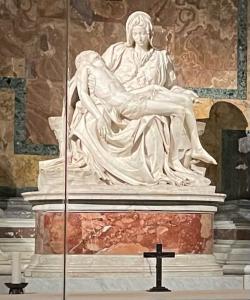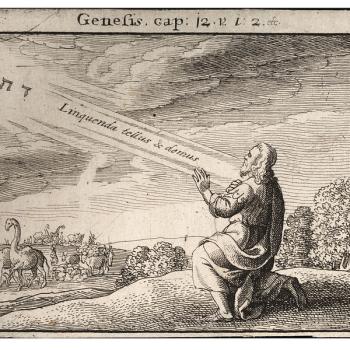
Dietrich Bonhoeffer wrote in God is in the Manger: Reflections on Advent and Christmas, “Whoever does not know the austere blessedness of waiting—that is, of hopefully doing without—will never experience the full blessing of fulfillment.” So true. Advent, which ended last night, is all about waiting. Not only does Advent entail waiting for Jesus’ birth, which we celebrate today. It is also about the Second Advent, when Jesus comes again. Such waiting is “austere,” that is, severe and harsh. But it does not lead the faithful to despair, but to energizing comfort and joy.
I have read or heard somewhere that many women in Israel at the time of the angel’s appearing to Mary longed to be the mother of the Messiah. Conditions were severe under the Roman Empire. The Pax Romana or Roman Peace was a cruel joke to many of its conquered subjects. So, these Jewish women longed to bring the messianic deliverer into the world. Theirs was an austere hope.
Luke chapter 1 informs us that God chose Mary to be the mother of the Messiah. No doubt, the angel’s appearance and announcement took her by surprise. At first, she was “greatly troubled.” For one, she was not even married, only engaged to be married. She and Joseph had not yet consummated their union, when the angel informed her that she would bring the anointed one into the world:
“Greetings, you who are highly favored! The Lord is with you.” Mary was greatly troubled at his words and wondered what kind of greeting this might be. But the angel said to her, “Do not be afraid, Mary; you have found favor with God. You will conceive and give birth to a son, and you are to call him Jesus. He will be great and will be called the Son of the Most High. The Lord God will give him the throne of his father David, and he will reign over Jacob’s descendants forever; his kingdom will never end.” “How will this be,” Mary asked the angel, “since I am a virgin?” The angel answered, “The Holy Spirit will come on you, and the power of the Most High will overshadow you. So the holy one to be born will be called the Son of God. Even Elizabeth your relative is going to have a child in her old age, and she who was said to be unable to conceive is in her sixth month. For no word from God will ever fail.” “I am the Lord’s servant,” Mary answered. “May your word to me be fulfilled.” Then the angel left her. (Luke 1:28-38; NIV)
Upon receiving this news, Mary hurried off to visit her cousin Elizabeth. Elizabeth was also expecting a son who would become John the Baptist, the forerunner to the Messiah. Elizabeth shared with Mary that the baby in her womb leapt for joy on hearing Mary’s voice (Luke 1:44). She then said to Mary, “Blessed is she who has believed that the Lord would fulfill his promises to her!” (Luke 1:45; NIV)
In response, Mary exclaimed,
“My soul glorifies the Lord
and my spirit rejoices in God my Savior,
for he has been mindful
of the humble state of his servant.
From now on all generations will call me blessed,
for the Mighty One has done great things for me—
holy is his name.
His mercy extends to those who fear him,
from generation to generation.
He has performed mighty deeds with his arm;
he has scattered those who are proud in their inmost thoughts.
He has brought down rulers from their thrones
but has lifted up the humble.
He has filled the hungry with good things
but has sent the rich away empty.
He has helped his servant Israel,
remembering to be merciful
to Abraham and his descendants forever,
just as he promised our ancestors.” (Luke 1:46-55; NIV)
Mary and Elizabeth experience the joy of a promise fulfilled: God had come to his people’s aid to deliver them, and their two sons would pave the way. Mary praises God for being “mindful of the humble state of his servant.” She is certainly correct when she proclaims: “From now on all generations will call me blessed, for the Mighty One has done great things for me—holy is his name.”
And yet, those who fear him still await deliverance. Yes, “His mercy extends to those who fear him, from generation to generation.” And while God “has performed mighty deeds with his arm” throughout history, including scattering “those who are proud in their inmost thoughts,” bringing “down rulers from their thrones,” the proud still rule in so many quarters. Yes, God “has lifted up the humble” at various times and places. Yes, God “has filled the hungry with good things but has sent the rich away empty.” And yet, the rich still oppress the poor in various ways. It leads me to ask: where is the remembrance “to be merciful” to “Abraham and his descendants forever,” for all who fear his name?
The title of one Christmas article reads, “Jesus in the rubble: Christmas celebrations in Bethlehem cancelled.” Just like in the first century, Jesus comes to a world torn apart by violence and war, injustice and wickedness, hatred and indifference, depression and sorrow, confusion and chaos. What is different? Why aren’t my hopes dashed to pieces like the rubble that cradles the baby Jesus in Bethlehem? Why do I experience energizing comfort and joy?
It is because Mary’s song awaits ultimate fulfilment at the end of history. God will again perform “mighty deeds with his arm.” God will again scatter “those who are proud in their inmost thoughts.” God will again bring “down rulers from their thrones” and lift “up the humble.” God will again “fill the hungry with good things” and send “the rich away empty.” God will again remember “to be merciful to Abraham and his descendants forever,” to those who fear him and believe in his name.
And while Mary’s song awaits ultimate fulfilment at the end of history at Jesus’ second advent, surely the first advent breaks in on Christmas Day, Christmastide, and throughout the year, wherever Jesus makes an appearance in the lives of those who fear him and who hope in him. It is an austere hope in light of which God calls us to live with energizing comfort and joy today.
In his Christmas eve address from St. Peter’s Basilica in Rome, Pope Francis shared: “Tonight, our hearts are in Bethlehem,… where the Prince of Peace is once more rejected by the futile logic of war, by the clash of arms that even today prevents him from finding room in the world.” Whereas emperors like Caesar undertake censuses to fund military campaigns and their empires’ expansion, “the King of history chooses the way of littleness.” Caesar’s census of the known world (recounted in Luke 2) “manifests the all-too-human threat that runs through history: the quest for worldly power and might, fame and glory. But God “does not eliminate injustice from above by a show of power, but from below, by a show of love.”
The chosen “way of littleness” and “show of love” “from below” rather than the “show of power” “from above” is part and parcel of that “austere blessedness of waiting” for God to act in the here and now and with finality on the stage of human history. This is exactly how Jesus operated throughout his life, and how he leads his followers to act today.
We wait by acting with hope against hopelessness, of hoping without fulfilment in the here and now, confident that the day will come when we experience “the full blessing of fulfilment.” How do we act in view of the “austere blessedness of waiting”? By acting daily from humble service below, not fanfare and fame above, from the power of love, not the love of power.
“Jesus in the rubble” inspires me with the energizing comfort and joy of his presence to keep acting in view of the “austere blessedness of waiting,” actively waiting for “the full blessing of fulfilment.” I wait in hope that someday, God will rebuild my son Christopher’s life from the rubble of his catastrophic brain injury, injustice, indifference, and abandonment in so many quarters. Until that day, I keep visiting his bedside, keep tending to his needs, keep advocating for him and his family, knowing that “the austere blessedness of waiting” requires austere actions in view of “the full blessing of fulfilment.”
We who act in keeping with “the austere blessedness of waiting” on Christmas Day and throughout the year do not seek “the full blessing of fulfilment” now. We do not fear that we are missing out on some “best life now” Christmas Day extravaganza as we kneel at Jesus’ cradle in the rubble. He teaches us then and now that in following him we do not ignore, discount, or minimize people’s pain and suffering. We sit with them in the rubble and rebuild life with them stone by stone, brick by brick. This is “the way of littleness,” the “show of love.”
We rejoice with Mary and the babe wrapped in her embrace at his birth and following his death that “the full blessing of fulfilment” still awaits us at Jesus’ second Advent. We rejoice that on that day we will experience the realization of her words once and for all:
His mercy extends to those who fear him,
from generation to generation.
He has performed mighty deeds with his arm;
he has scattered those who are proud in their inmost thoughts.
He has brought down rulers from their thrones
but has lifted up the humble.
He has filled the hungry with good things
but has sent the rich away empty.














